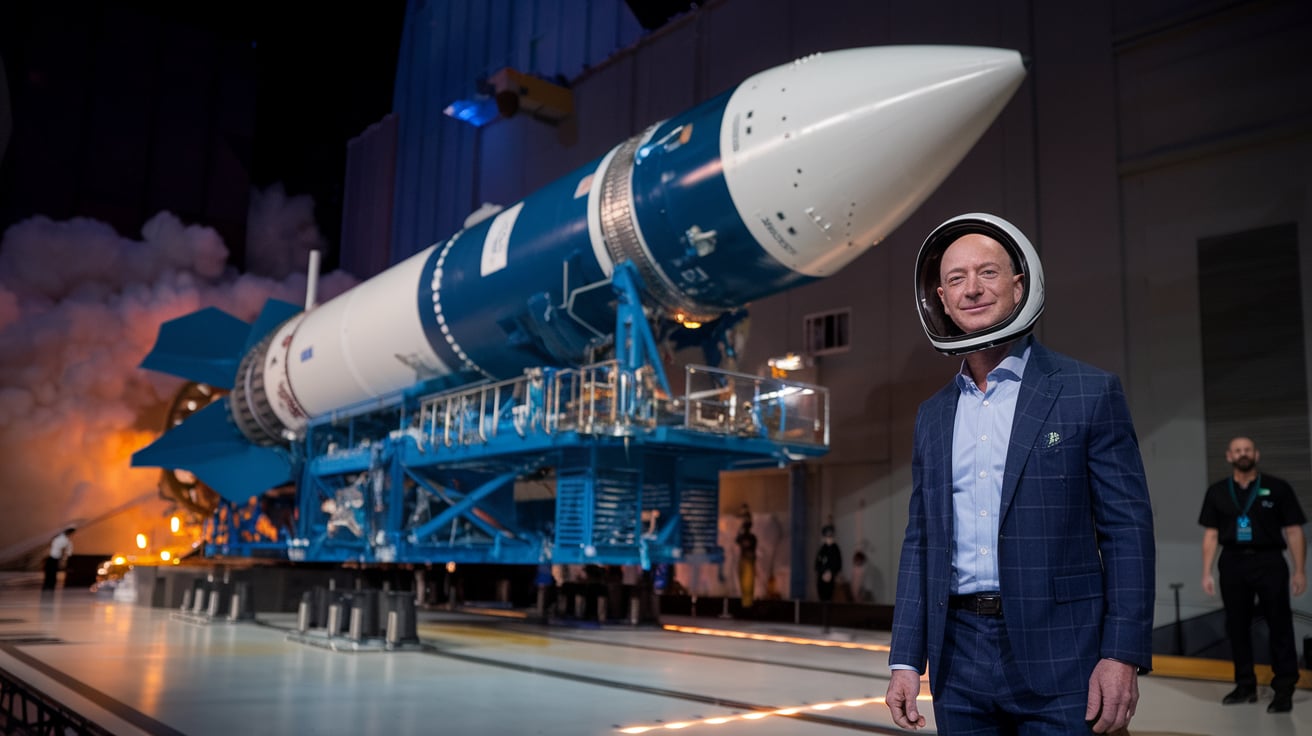Launching of Jeff Bezos’ Blue Origin Rocket is Postponed Due to the ‘Vehicle Subsystem Issue’
The much-anticipated launch of Blue Origin’s rocket, spearheaded by Amazon founder Jeff Bezos, faced a delay due to a “vehicle subsystem issue.” Blue Origin, a leading player in the private space exploration sector, has captured global attention with its ambitious projects. This article delves into the recent postponement, its implications, and what it means for Blue Origin’s future. Our focus keyword for this discussion is “Blue Origin.”
Overview of Blue Origin
Blue Origin, founded in 2000 by Jeff Bezos, aims to make space travel accessible to everyone. With the motto “Gradatim Ferociter” (Latin for “Step by Step, Ferociously”), the company focuses on developing reusable rockets to reduce costs and promote sustainable space exploration. Blue Origin’s flagship projects include the New Shepard suborbital rocket and the New Glenn orbital launch vehicle, both designed to revolutionize space travel.

The Postponement Announcement
Blue Origin announced that the scheduled rocket launch had to be postponed due to a “vehicle subsystem issue.” While details about the exact nature of the problem remain sparse, the company assured stakeholders that the decision was made out of an abundance of caution, prioritizing safety above all.
- What is a Vehicle Subsystem Issue? A vehicle subsystem issue refers to any malfunction or irregularity in the rocket’s critical components, such as propulsion systems, guidance mechanisms, or structural elements. Such problems, if unresolved, could jeopardize the mission’s success or endanger payloads and personnel.
- Blue Origin’s Transparency Blue Origin has the reputation for maintain transparency in setbacks. The company’s quick announcement and assurance of addressing the issue reflect its commitment to building trust with the public and its stakeholders.
Implications of the Delay
While delays in the aerospace industry are not uncommon, they often carry significant implications for companies, investors, and scientific missions.
- Impact on Blue Origin’s Timeline: The postponement may affect Blue Origin’s broader schedule, including upcoming launches and projects. Any delay can have a domino effect, pushing back other critical missions.
- Stakeholder Concerns: Investors and partners may grow apprehensive about recurring issues, particularly if delays become frequent. However, Blue Origin’s proactive measures to address problems head-on could mitigate such concerns.
- Market Competition: The private space industry is highly competitive, with companies like SpaceX and Virgin Galactic vying for dominance. Delays could potentially impact Blue Origin’s market position, giving rivals an edge in the race for innovation.

Blue Origin’s History of Delays and Resilience
This is not the first time Blue Origin has faced delays. However, the company has consistently demonstrated resilience and a commitment to overcoming challenges.
- New Shepard Program: Blue Origin’s New Shepard program experienced initial setbacks during its testing phases. Despite this, the reusable rocket has successfully completed numerous missions, including manned flights.
- New Glenn Development: The New Glenn orbital rocket has also faced delays, primarily due to technical challenges and supply chain disruptions. Nonetheless, Blue Origin continues to push forward, ensuring that each launch meets the highest safety standards.
Lessons from Competitors
Blue Origin’s competitors have also faced delays but managed to turn challenges into opportunities. For instance:
- SpaceX: SpaceX, led by Elon Musk, has experienced multiple launch failures but used each setback as a learning opportunity. Today, it’s a leader in reusable rocket technology.
- Virgin Galactic: Virgin Galactic encountered numerous delays in its mission to commercialize space tourism. The company’s perseverance eventually led to successful passenger flights.
Blue Origin can draw inspiration from these examples to navigate its current challenges.
The Role of Safety in Space Exploration
Safety is paramount in the aerospace industry. Blue Origin’s decision to postpone the launch underscores its commitment to prioritizing the safety of its missions, payloads, and, ultimately, human lives.
- Rigorous Testing: Blue Origin’s rockets undergo extensive testing to identify and address potential issues. The delay highlights the company’s dedication to thorough evaluations.
- Industry Standards: Adhering to stringent safety standards not only ensures successful missions but also enhances the company’s credibility and reputation.
Public Reaction to the Postponement
The announcement of the delay elicited mixed reactions from the public, industry experts, and investors.
- Support for Safety Measures: Many applauded Blue Origin for prioritizing safety over deadlines, emphasizing the importance of caution in such a high-stakes industry.
- Criticism and Concerns: Some critics questioned whether the postponement reflects deeper systemic issues within Blue Origin’s operations. However, such concerns are speculative and lack substantial evidence.
The Future of Blue Origin
Despite the delay, Blue Origin’s long-term goals remain unchanged. The company continues to work toward making space accessible and sustainable. Upcoming initiatives include:
- Orbital Reef: A partnership with Sierra Space to develop a commercial space station, Orbital Reef aims to redefine the concept of living and working in space.
- Lunar Missions: Blue Origin’s lunar lander program is set to play a crucial role in NASA’s Artemis program, which seeks to return humans to the Moon.
- Expanding Commercial Flights: With successful manned missions aboard New Shepard, Blue Origin is gearing up to expand its space tourism offerings.

Conclusion
The recent postponement of Blue Origin’s rocket launch due to a “vehicle subsystem issue” serves as a reminder of the complexities involved in space exploration. While delays may pose short-term challenges, they also underscore the company’s commitment to safety and excellence. As Blue Origin continues to innovate and overcome obstacles, its vision of making space travel accessible to all remains steadfast. By addressing this setback with resilience and transparency, Blue Origin reaffirms its position as a leader in the private aerospace sector.



